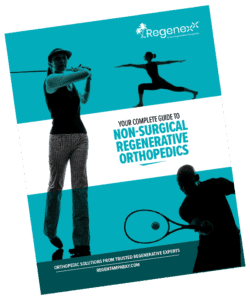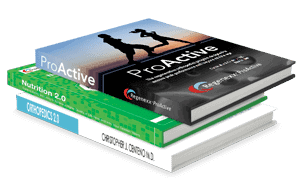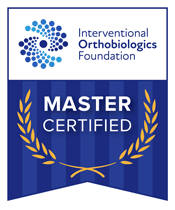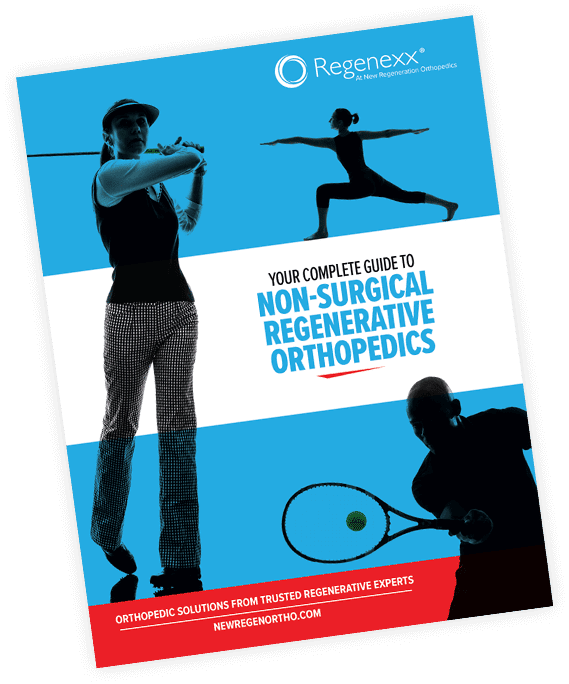More often than not, patients ask us how they can improve the quality or quantity of their stem cells before a procedure. Over a decade of orthopedic stem cell experience and research has taught us that there are in fact certain things that you may be able to do to improve your stem cell function. Here are 9 ways to enhance your stem cells before treatment.
1. Nutrition
Reduce Your Sugar Intake
This common advice is worthy of being reiterated. Americans consume too much sugar. When we say sugar, we mean any food that is quickly absorbed and converted to glucose in the blood. Obvious sugar sources include table sugar that we put in coffee, or soda, desserts, and fruit juices, etc. Less obvious sugars include refined grains in bread, crackers, and pasta. Sugar intake combined with too little activity produces insulin spikes in the blood which can cause metabolic syndrome, which can lead to weight gain, insulin resistance, and high blood pressure. According to one study, adult stem cells lived longer in cell culture when glucose levels were reduced. High blood sugar has also been found to decrease the regenerative potential of stem cells.
It is extremely important to make an effort to decrease or eliminate added sugars. We are particularly concerned today with processed, added sugars as more published research continues to show that these feeds not only promote cancer but a wide variety of chronic diseases. Cutting sugar out of your diet will accomplish a number of things including improving your quality of life, helping you manage your weight, and improving your stem cells. Interestingly, many fruits (despite the sugar content), such as berries, actually counter the negative effects of sugar due to their high phytonutrient content.
A note of caution: Switching to artificial sugars, such as sucralose (e.g., Splenda—yellow packets) and aspartame (e.g., NutraSweet—blue packets), isn’t the answer to weaning yourself off sugar. Artificial sugars act similarly to real sugar in your body and also can stimulate excessive insulin release and lead to metabolic syndrome and obesity. These substitutes also disrupt your gut flora and are associated with a greater risk of stroke and dementia.
To get started, we recommend considering a strict, low-glycemic diet. This kind of diet is beneficial because it helps control insulin release and blood sugar. The glycemic load in carbohydrates can be measured on a high to low scale with high meaning a quick spike in blood sugar and low meaning sugars are slowly digesting and being absorbed into the blood. For example, fruit juices have a high-glycemic index as they hit your bloodstream very fast causing a heavy spike in insulin. Whereas, most vegetables, legumes, and whole unrefined grains are on the lower-glycemic end of the scale.
It is wise to be on a diet that excludes all or nearly all sugar prior to your stem cell procedure. It is also worth having your doctor check your blood for hemoglobin A1C (HBA1C) which reflects the average blood glucose for the prior 3 months. The HBA1C you’re aiming for is close to 5.0 or lower.
Go Organic
Pesticide residues are commonly found on and in the foods we eat. For example, the USDA found that an apple can commonly have 47 different pesticide residues (after washing!) of which, many are known as probable carcinogens, hormone disruptors, neurotoxins, developmental or reproductive toxins. Check out What’s On My Food? to search for specific foods.
After only six days of eating organic food, adults and children can have an average of 60% reduction in the levels of synthetic pesticides measured in their urine, compared to when they were eating a conventional diet. Those eating lower pesticide containing diets have a lower risk of developing cancer. Pesticides can induce premature aging of adult stem cells and shift their path toward making more fat cells instead of tendon or cartilage cells, for example. To decrease your pesticide load, shop and eat according to the Clean Fifteen and Dirty Dozen.
Reduce Your Calories
It has been proven that even short-term calorie restriction can improve stem cell function. Americans are continuing to gain weight at an alarming rate as obesity percentages continue to rise. One study has shown that when mice are on a reduced calorie diet, their muscle stem cells have improved function. This improvement was seen in both young and old mice. Short-term calorie restriction has also been shown to improve the functionality of mesenchymal stem cells.
We mentioned that this option has been effective in mice, but what about humans? At least one human study has shown that losing weight via a low-calorie diet helped to increase the number of circulating stem cells in the blood. We recommend reducing your calorie intake by approximately 20% during the two weeks before you have your stem cells extracted. One strategy that can be helpful is called intermittent fasting, time restricted feeding, or fasting mimicking diets.
Reduce Your Triglycerides
Our blood contains a storage system for unused carbohydrates. This storage system is known as our triglycerides or TRGs. Our bodies burn carbs for energy and when there are too many to burn, they are stored as TRGs for later use. If we regularly consume more carbs than we can burn off, our triglycerides can become dangerously high, increasing the risk of heart disease and high blood pressure. TRGs are also related to metabolic syndrome and weight gain, especially when combined with an excessive intake of sugar and calories.
In our experience, patients who have high triglycerides or obesity issues also have stem cells that grow poorly. Our recommendation for those looking to lower their TRGs is to get them measured, reduce your sugar, carbohydrates, and calorie intake to get your body down to normal before having your stem cells extracted. You may also consider a very high-quality fish oil supplement to reduce triglyceride levels as well.
2. Stay Active, Exercise, and Lift Weights
Studies have shown that older animals that are more active have better quality stem cells that create more bone. This research also shows that stem cells in muscles are increased by exercise and lifting heavy weights.
The key is consistent activity. If you are working out sparsely now, try to amplify your routine. Visit the gym or work with a skilled personal trainer. Do you lift weights already? Try to up your lbs. If you bike or run, push yourself to run faster and for a longer period of time. In general, target 150 minutes per week of aerobic activity. Perhaps a more time efficient approach to aerobic fitness is high-intensity interval training though you should talk to skilled professional before implementing.
If you have injuries or health issues that limit your workout capabilities, simply focus on what you can do. Try light activities in the pool or take daily walks. The goal is simply to increase your activity level so that the stem cells that we do harvest are of the highest quality from the start.
Note of caution: For those with an orthopedic or medical condition that limits your ability to be active, your activity may need to be initially progressed under the guidance of a skilled physical therapist.
3. Try Taking Healthy Supplements
Common nutritional supplements may be beneficial to both stem cell and cartilage. These include vitamin D3 and C, Curcumin, Glucosamine, Chondroitin, Resveratrol, and Fish Oil.
Our Regenexx advanced stem cell support formula contains vitamins D and C, curcumin, glucosamine, chondroitin, resveratrol, L-carnosine, and bitter melon as main ingredients. These were chosen because there is research demonstrating their benefits and their effects on stem cells.
Vitamins C and D
Vitamin C helps our bone marrow stem cells by promoting their proliferation (increase in numbers). Vitamin D3 can reduce the aging of our stem cells, make them healthier, and help them differentiate, or turn into other types of cells.
Curcumin
Curcumin may sound familiar as it is the active ingredient in the spice, turmeric. Curcumin has strong anti-inflammatory properties and performs well in helping mesenchymal stem cells function better. This supplement has also been shown to upregulate bone formation and suppress oxidative stress, which alleviates bone loss. It also seems to have a protective effect from the damage of osteoarthritis.
Glucosamine and Chondroitin
Glucosamine and Chondroitin protect cartilage and reduce cartilage loss and in independent testing by Regenexx’s laboratory, helped stem cells function better.
Resveratrol
Studies have shown that resveratrol also protects cartilage and helps stem cells differentiate and multiply. Resveratrol also helps to control blood sugar. You can get resveratrol through healthy foods like red and purple grapes and blueberries, though it is nearly impossible to get the amount that you would need in order to optimize its health benefits for cartilage and joint health through food alone. In Regenexx testing, resveratrol also performed very well.
4. Review Your Prescription and Over-The-Counter Medications
Based on our experience with growing stem cells, we have found that there are various prescription drugs that actually hurt stem cell ability to multiply and grow. We have seen many patients that were on a certain medication and had difficulty growing their stem cells. Taking the patients off these medications reversed the problem. Talk to your Regenexx doctor about which medications need to be restricted and which medications are likely safe to continue taking. Never stop a prescription medication without first consulting with your prescribing provider.
Note that Quinolone antibiotics in particular, such as Cipro and Levaquin, hurt not only stem cells but also tendon cells. These antibiotics are typically given for infections such as urinary tract infections and some orthopedic infections. Quinolones have been associated with serious tendon ruptures. Ligaments have their own stem cells, so when medications damage those cells, these ligaments or tendons can eventually weaken or fail. This can lead to tendinopathy or tendon rupture.
Another example is Non-Steroidal Anti-Inflammatory Drugs (NSAIDS) such as ibuprofen, Aleve, Motrin, Mobic, Celebrex, etc. These medications increase risks of gastrointenstinal bleeding, kidney failure, and stroke as well as negatively impact the function of stem cells. Natural anti-inflammatories such as Curumin and Fish Oil do not have these negative adverse effects.
5. Avoid Taking Steroids When Possible
From asthma to knee pain to herniated discs, high-dose steroids (sometimes referred to as cortisone) are used for many reasons. While they may be powerful anti-inflammatories, the issue is that steroids wreak havoc on stem cells. Steroids have the potential for serious adverse effects. One study concluded that steroids actually “flipped a switch” on mesenchymal stem cells and made them not want to turn into bone.
If you are scheduled for a stem cell treatment and are taking steroids (oral, topical, inhaled, or injections), discuss this with your Regenexx physician. Your physician can help recommend safer alternatives or acceptable substitutes to protect your stem cells, and then discuss with your prescribing provider.
6. Avoid Environmental Chemicals
Unfortunately, we are exposed to thousands of chemicals on a daily basis through food, air, and products with which we come in contact. Although the dose of each individual chemical is rather low, the cumulative chronic exposure is now thought to negatively impact our body’s overall health and march toward disease. Many of these chemicals disrupt key pathways in our body’s chemistry as it relates to stem cell function, hormones, the immune system, nervous system, cancer formation, and others.
We can’t control all of these factors but we can make informed decisions about products (and food) that our body interacts with on a daily basis. We recommend making decisions about the purchase of personal care products, such as makeup, sunscreen, cleaning products, etc., based on the extensive databases that were put together by the Environmental Working Group (EWG) called Skin Deep and the Guide to Healthy Cleaning.
7. Reduce Your Alcohol Intake
Alcohol can have profound negative impacts on stem cell function, so this should generally be avoided (or highly reduced) before and after the procedure.
8. Stop Smoking or Using Tobacco
Smokers do not heal as well as non-smokers. If you are seeking to maximize your outcomes, please stop smoking!
9. Consider a Trip to a Higher Altitude
Many elite athletes sleep in lower oxygen environments to reap the benefits of low oxygen. Stem cells grow and stay more viable at low oxygen levels. What does this mean? Sometimes low oxygen is better. When the oxygen level is normal, stem cells differentiate better. In short, when growing stem cells, low oxygen is better; when differentiating, or turning them into other tissues, normal oxygen is preferred.
Before your stem cell procedure, consider taking a little vacation to a location with a higher altitude so that your stem cells can thrive.
It is important to note that your stem cell procedure will only ever be as effective as your stem cells are healthy. Focus on these 9 ways to improve your stem cells to get the best possible results from your upcoming procedure.











